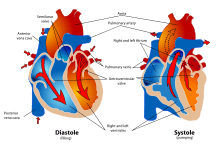systole
See also: Systole
English

The diastole (filling) and systole (pumping) processes of a healthy human heart
Etymology
Borrowed from New Latin, from Ancient Greek συστολή (sustolḗ), from συστέλλω (sustéllō, “to contract”), from σύν (sún, “together”) + στέλλω (stéllō, “to send”).
Noun
systole (plural systoles)
- (physiology) The rhythmic contraction of the heart, by which blood is driven through the arteries.
- 1972, Vladimir Nabokov, Transparent Things, McGraw-Hill 1972, pp. 78-9:
- A double systole catapulted him into full consciousness again, and he promised his uncorrected self that he would limit his daily ration of cigarettes to a couple of heartbeats.
- 1974, Anthony Burgess, The Clockwork Testament:
- There is no essential virtue in comfort. To be relaxed is good if it is part of a process of systole and diastole. Relaxation comes between phases of tenseness.
- 1972, Vladimir Nabokov, Transparent Things, McGraw-Hill 1972, pp. 78-9:
- (prosody) A shortening of a naturally long vowel.
Antonyms
Hypernyms
- (prosody): metaplasm
Translations
Dutch
Etymology
From French systole, from Ancient Greek συστολή (sustolḗ), from συστέλλω (sustéllō, “to contract”).
Pronunciation
- IPA(key): /sɪsˈtoː.lə/
Audio (file)
French
Etymology
Borrowed from New Latin, from Ancient Greek συστολή (sustolḗ), from συστέλλω (sustéllō, “to contract”), from σύν (sún, “together”) + στέλλω (stéllō, “to send”).
Pronunciation
- IPA(key): /sis.tɔl/
Antonyms
Further reading
- “systole” in le Trésor de la langue française informatisé (The Digitized Treasury of the French Language).
This article is issued from
Wiktionary.
The text is licensed under Creative
Commons - Attribution - Sharealike.
Additional terms may apply for the media files.